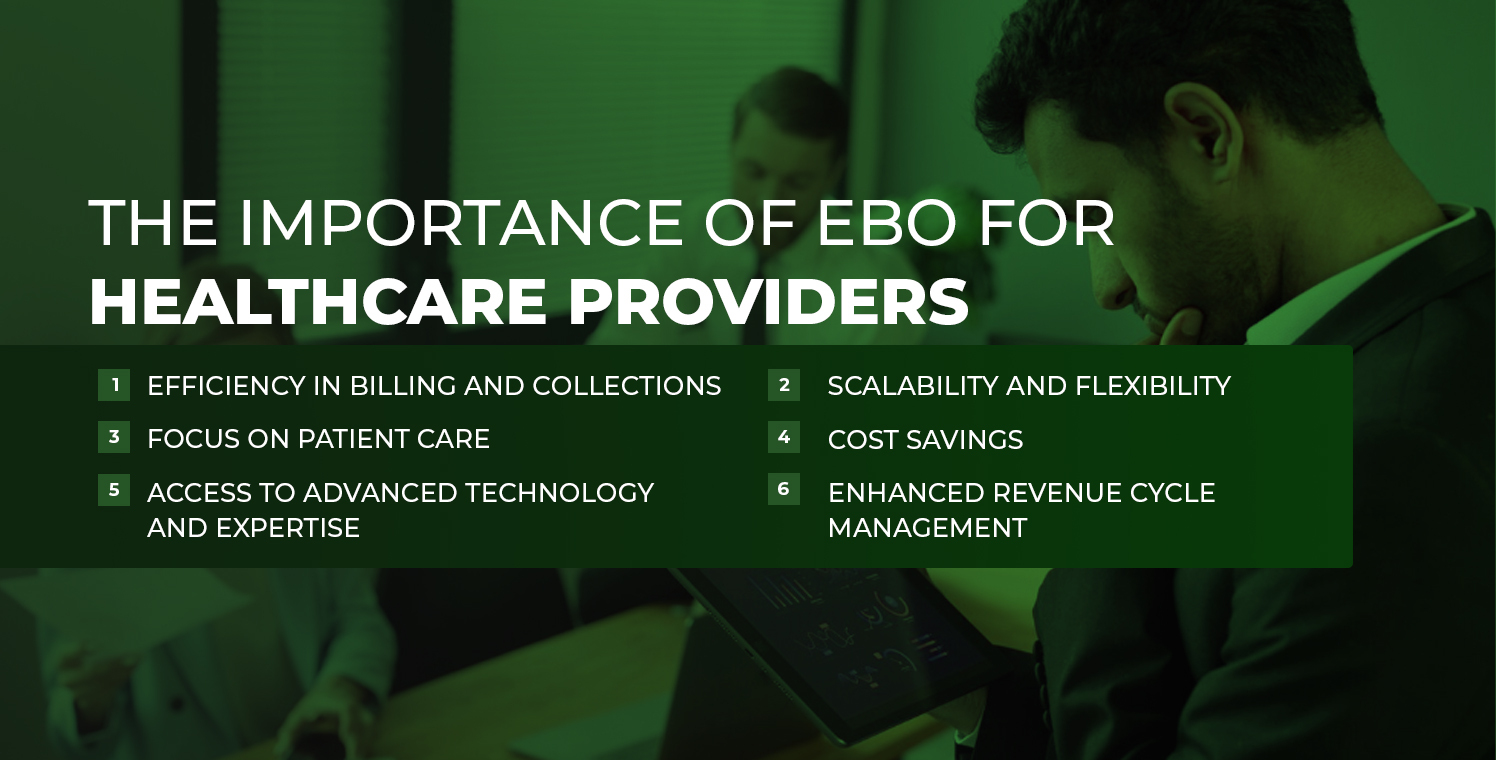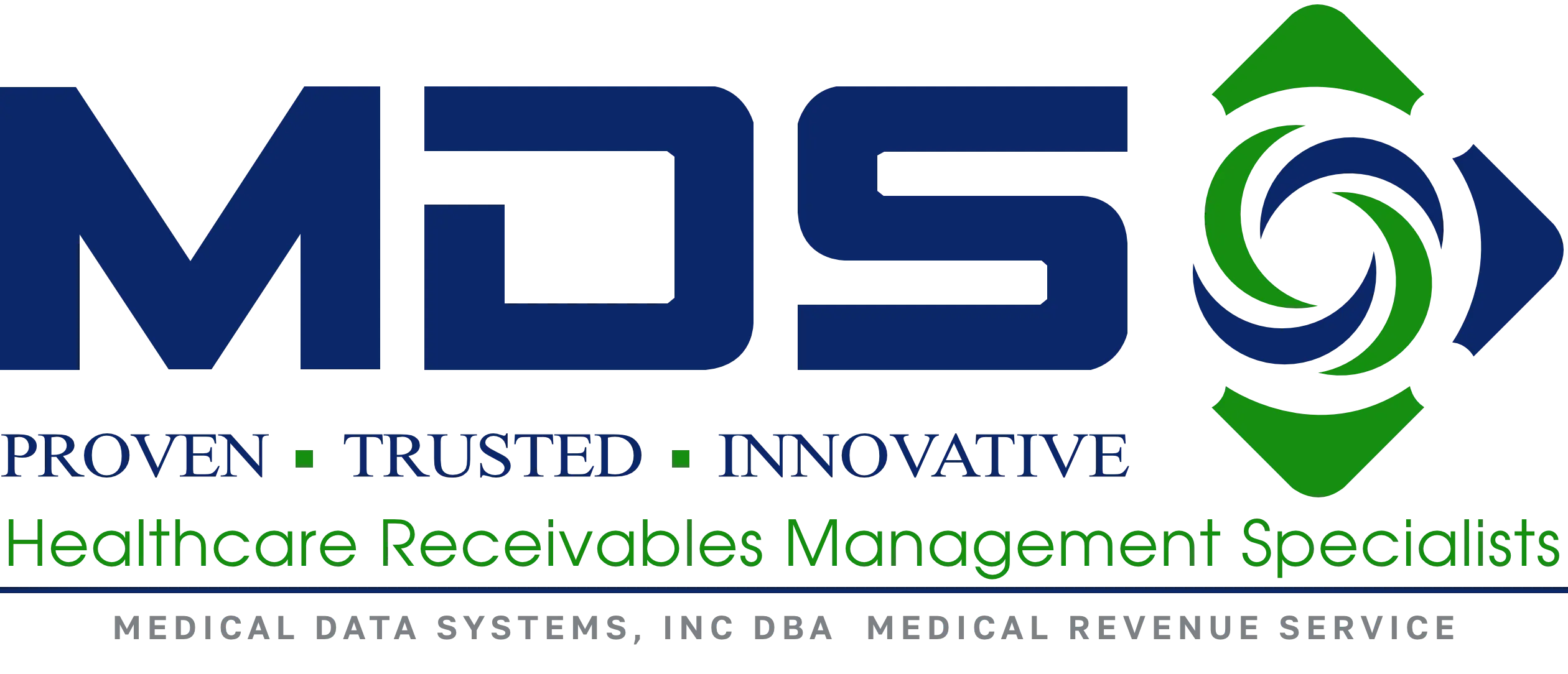Managing every aspect of your revenue cycle can be daunting as a healthcare provider. Our focus is to help eliminate this stress so that more time can be spent on patients and their satisfaction. Your team can focus on their core responsibilities since they will be freed from time-consuming duties. This commitment is until we improve your revenue recoveries, reduce the A/R aging, and decrease your operation cost.
Healthcare Providers are now looking for top RCM partners and strategies to tackle the risk of inflation affecting financial performance. These strategies aim to cut costs and boost efficiency in revenue collection. Implementing an Extended Business Office (EBO) is a prominent solution.
What is an Extended Business Office (EBO) in Healthcare?
Reimbursement complexities and escalating regulatory demands are straining medical facilities. Coordinating patient care, optimizing revenue, and managing health insurance is becoming more demanding. This raises the question: what is an Extended Business Office (EBO) in healthcare? An EBO is a strategic approach focused on effectively managing units that provide various services. These services include collections, medical coding, and patient education. The goal is to improve both efficiency and compliance.
In other words, an Extended Business Office (EBO) is the company division that works very closely with your operations. It seamlessly continues your operations and offers debt collection services tailored to your company’s unique needs. This might involve updating privacy policies or refining medical coding guidelines to handle customer debts more effectively. Additionally, EBOs implement best practices in revenue cycle management. These include continuous billing, collection, and denial processes.
An EBO leverages established revenue cycle management practices, addressing a spectrum of needs from systematic billing and collections to efficient denial management. Henceforth, EBOs are paramount in bridging the gap between healthcare practices and business office management.
The Importance of EBO for Healthcare Providers
Healthcare and insurance extended business office services have been around for several decades. Recently, their advantages have increased. This growth is due to technological advancements, which provide extensive automation features for current and future needs.

-
Efficiency in Billing and Collections
Clean claims are vital to maintaining a healthy revenue cycle. A recent survey highlights that more hospitals are now monitoring a key performance indicator. They are focusing on the gap between clean claims and initial claim denials.
The above survey also reveals a decline in patient collection rates. These rates dropped from 54.8 percent in 2021 to 47.8 percent in 2023. As a result, securing patient payments is becoming increasingly difficult.
An EBO’s dashboard and analytics interface should enable claim status tracking by patient, service provider, and payer. Additionally, it should monitor contract-related payer delays and provide actionable insights into claim rejection trends.
-
Focus on Patient Care
EBOs enhance the patient experience by automating follow-up processes. This ensures timely and effective communication after appointments. Automation leads to fewer missed appointments and better adherence to treatment plans. Ultimately, this improves patient health outcomes.
Efficient revenue cycle management reduces administrative burdens, allowing healthcare providers to dedicate more time and resources to patient care.
An EBO allows physicians and staff to focus on patient interactions, diagnoses, and treatment plans. This eliminates distractions from billing and collections. Improved focus can enhance patient satisfaction, strengthening patient relationships and loyalty.
-
Cost Savings
Healthcare organizations can achieve significant cost reductions by outsourcing non-core functions to an EBO. EBOs offer economies of scale, optimized staffing levels, and advanced technology.
EBOs significantly reduce overhead and operating costs. This reduction is primarily due to the decreased need for large administrative support teams, leading to lower labor costs and minimized human errors. These efficiencies contribute to the long-term financial health of healthcare facilities.
Additionally, by improving claim accuracy and reducing denials, EBOs help to maximize reimbursement rates. These factors collectively contribute to substantial cost savings for healthcare providers.
-
Enhanced Revenue Cycle Management
An EBO brings a wealth of expertise in revenue cycle management. They employ industry best practices, leverage advanced analytics, and stay updated with regulatory changes.
With comprehensive, automated EBO services explicitly dedicated to the revenue cycle, facilities can ensure optimized end-to-end processes. This optimization reduces claim errors, accelerates reimbursement timeliness, and improves collection rates.
Again, EBOs in medical billing also help increase cash flow, which can be reinvested in quality patient care. EBOs help healthcare providers improve cash flow and financial stability by streamlining the entire revenue cycle.
-
Scalability and Flexibility
Healthcare organizations often face fluctuations in patient volume, especially during peak seasons or unforeseen events like pandemics. EBOs offer the flexibility to scale services up or down to match these changes.
For example, during a seasonal surge in patient admissions, an EBO can quickly increase its workforce. This helps handle the increased billing and coding demands. Conversely, during slower periods, the EBO can adjust staffing levels. This optimizes costs without compromising service quality.
EBOs can also adapt to changes in a healthcare organization’s operations, such as mergers or acquisitions. They can also adjust to the implementation of new electronic health record systems. Their flexible services ensure a seamless transition and minimize disruptions to the revenue cycle.
-
Access to Advanced Technology and Expertise
Modern EBOs leverage cutting-edge technology, using artificial intelligence and machine learning to enhance their services. They also provide detailed metrics and analytics, which offer insights into payer tendencies, claim rejection trends, and other key areas.
EBOs invest heavily in advanced technologies and employ skilled professionals with deep industry knowledge. This expertise helps them implement innovative solutions, optimize processes, and mitigate compliance risks.
Also, EBOs employ accredited medical coders and other experts. These professionals understand the complexities of medical billing and insurance reimbursements. Their specialized knowledge ensures that claims are accurately coded, submitted promptly, and effectively pursued.
Get Help from Medical Data Systems Inc.’s Extended Business Office
The dedicated team at Medical Data Systems Inc. assists your patients in navigating medical billing. This ensures your hospital or clinic benefits from increased payments. Our dedicated representatives treat your patients with the utmost professionalism and care. You can avail yourself of our early-out programs in your practice, which provide tailored debt recovery strategies. Let us manage your revenue cycle. Contact Medical Data Systems Inc extended business office today to get started.
